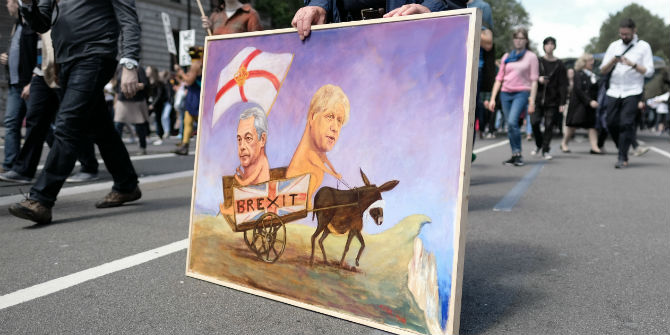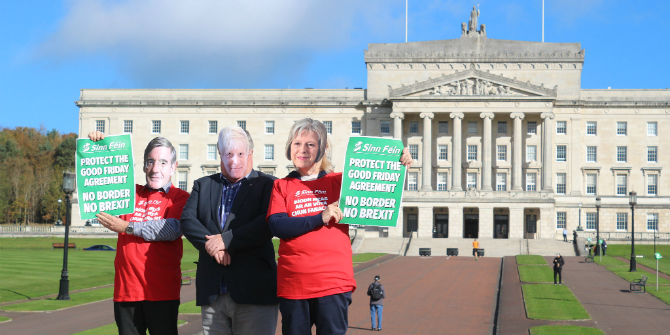 Is there a duty to implement the EU referendum result? Not if you believe it to be a profound mistake, argues Albert Weale. We cannot sensibly and intelligibly use the language of ‘the will of the people’ in respect of the referendum result. It is not simply a device for the registering of the preferences of individuals. It must also be the institutionalisation of a public discussion.
Is there a duty to implement the EU referendum result? Not if you believe it to be a profound mistake, argues Albert Weale. We cannot sensibly and intelligibly use the language of ‘the will of the people’ in respect of the referendum result. It is not simply a device for the registering of the preferences of individuals. It must also be the institutionalisation of a public discussion.
Among many of those who were passionately convinced that Remain was the right option, there is a belief that to continue the campaign is somehow to betray democratic values. They wish the result had been otherwise, but given how the referendum turned out, the task is to make the best of a bad job and ensure that the UK can get the most advantageous deal possible on leaving the EU. Those holding this view like to think that if the result had gone the other way, then the Brexiteers would have accepted it, and so in fairness they feel that they should accept losing as best they can. British stoicism combines with presumed democratic principle to produce resignation.
As you would expect, among confirmed Brexiteers, the view that there is a duty to implement the result of the referendum is even stronger. For many people it would be much more comfortable to believe that democratic principles require citizens, including Remainers, to accept the Brexit referendum result and not oppose the fundamentals of current government policy. How much more agreeable it is to be told that our democratic duty means that we can just get on with our private lives, without taking an unpopular stance against a decision that the country has already made.

If you are in this position of seeking peaceable agreement, I bring you nought for your comfort. The principled questions posed by Brexit not only raise some of the most difficult and intricate issues in the theory of constitutional democracy, they also have personal – perhaps even existential – meaning for individuals. Like it or not, if you are a citizen of the United Kingdom, if you believe Brexit to be a profound mistake and if you are a true democrat, then you have a duty to oppose Brexit. To paraphrase Leon Trotsky on war: you may not be interested in Brexit; but Brexit is interested in you.
There are many reasons why someone might believe Brexit to be a mistake, but I shall refer to just four:
- You might believe that Brexit is economically damaging.
- You might believe that the principle of ‘taking back control’ was based on a false characterisation of the pooling of sovereignty that membership of the European Union involves.
- You might believe that the European Union offers opportunities of political cooperation that promote the common good of its constituent countries.
- You might believe that the European Union provided the framework for democratic consolidation in Europe.
You can hold to all of these propositions and acknowledge legitimate concerns about migration.
These are just some of the reasons why one might think that leaving the EU was a mistake. Note that all of these considerations have nothing to do with the character of those who advanced the Leave argument. When I debate these issues with my Leave friends and acquaintances, I do not think that they have lost their senses or that they harbour ethnic cleansing ambitions. I just think that they are wrong.
Of course, my Brexit friends and acquaintances pay me the reverse compliment of thinking that I am wrong, and clearly both sides cannot be right. In important political matters, complexity and uncertainty as to consequences makes it very hard to come to a fully justified political judgement. The burdens of judgement are just that, burdens. And if the defence of a great cause does not involve the burdens of judgement, then it is not a great cause.
Note – and this is very important both practically and in terms of democratic theory – that the differences to which I am referring are differences of judgement not of mere preference. Democracy, rightly understood, is not simply a device for the registering of the preferences of individuals. It must also be the institutionalisation of a public discussion in which evidence, argument and persuasion have a central place.
Very well, I imagine you saying. Democracy needs argument, but it also needs decision. Moreover, democrats should respect the result of the referendum as an expression of the popular will.
One way of justifying the claim that there can be no opposition to the result of the referendum is to appeal to the principles of what I shall call, following Max Weber, plebiscitary democracy. The theory of plebiscitary democracy can be expressed in three claims. Firstly, the people are sovereign. Secondly, the people as sovereign are entitled to express their will on matters of public policy through a referendum in which a simple majority is decisive. Thirdly, the function of the government is to implement the will of the people as decided by the referendum. As a corollary of these claims, it is argued, anything that frustrates the will of the people is simply anti-democratic. As a view of democracy, these claims are profoundly mistaken.
Begin with the claim that in a democracy it is the people who are sovereign. To justify this claim some theorists of democracy tell a simple story: once upon a time, the monarch was sovereign and the monarch’s will formed the basis of political authority. With democratisation, the will of the monarch was replaced originally by the will of representative bodies like parliaments and then by the will of the people themselves. So, democratic sovereignty now means that the people governs itself.
Yet, as H L A Hart pointed out many years ago, the storyline on which this principle of popular sovereignty is based makes no logical sense. Citizens as members of a people cannot give orders to themselves, unless we assume that there is a set of accepted rules by which the results of elections and the processes for making laws are validly defined. A people cannot govern itself directly without relying upon some underlying rules of the political game. Contrary to Rousseau, it is not that the British people is free only once every five years when it elects it representatives; rather it is free because its political representatives accept as an element of their procedures rules that make government accountable through elections.
The United Kingdom until recently has avoided the fallacies associated with ideas of popular sovereignty because of the historic continuity of its constitution – the phenomenon of new wine in old bottles – resting on the principle of parliamentary sovereignty going back to the seventeenth century, a phenomenon nicely recapitulated in the recent judgement of the High Court on the Miller case. But my conceptual point is that there is a general truth lurking in this particular history, namely that the making of constitutional rules – the secondary rules that define the primary rules of legislation – can only be done by political representatives.
Let me suppose, however, that this argument cannot stand and that we can meaningfully talk about the sovereignty of the people. For the people to exercise its sovereignty, it would have to formulate its collective will. But what does the phrase ‘the will of the people’ really mean? There is obviously one condition under which the phrase the ‘will of the people’ would make clear sense, namely in conditions of complete unanimity. In any other circumstance, the idea of the popular will must depend for its meaning on a definition of what proportion of the people short of unanimity is taken to be decisive.
In the 2016 referendum, the proportion of the people who were taken to be decisive was that of a simple majority. That majority was taken to define the popular will. Now, is there any reason why a simple majority might be taken to stand for the will of the people? Is there any magic, you may ask, in the figure of 50% plus 1?
As it happens, under certain conditions, the answer to this question is yes. It can be shown – and Kenneth O May has done so – through logical analysis that the rule of deciding issues by a simple majority is the only rule that satisfies certain intuitively reasonable requirements. In particular, simple majority rule gives each and every voter an equal voice without biasing the decision making process towards the status quo, or any other alternative. Any other rule will bias the collective choice in favour of particular individuals or in favour of particular alternatives. In short, so this argument runs, majority rule seems to encapsulate the principle of political equality. And, that being the case, majority rule gives us a plausible interpretation of the idea of the popular will.
But there is a catch. The demonstration of the close connection between political equality and the majority principle presupposes that the issues over which a choice is being made are well-defined. As such the argument cannot be applied to the referendum vote on Brexit. ‘Leave’ was never, and in the nature of the case, cannot be one alternative. It is a portmanteau term for a number of mutually inconsistent alternatives, as is now becoming painfully clear.
Once we break apart the Leave alternative into its component elements, we can see that a majority for Leave does not necessarily express anything like a popular will in respect of any one of those alternatives. Herein lies the origin of the powerful incantation: ‘Brexit means Brexit, but what does Brexit mean?’ And the answer is that it means one, but only one, of the feasible alternatives that were never placed singly before the electorate in the referendum.
We really cannot sensibly and intelligibly use the language of the will of the people in respect of the referendum result. This is quite apart from any disquiet that people may have expressed about the way in which the campaign was conducted.
There is a more modest line of argument in favour of taking the referendum as grounds for acceptance, which is the fact that it was authorised by parliament – which could have stipulated some minimum threshold turnout or a minimum super-majority. Parliament did not, and so we can infer that it intended a simple majority in the referendum to be decisive.
However, if one thing is clear in democratic theory, it is that there is no obligation to refrain from campaigning against or opposing a piece of legislation that has been validly adopted. To suppose that there is such an obligation that would imply that there is no right to campaign for a change of legislation or change in government policy. Consider any controversial piece of legislation, like the poll tax. Democracy is a matter of institutionalised government and opposition. In the UK’s parliamentary democracy, no parliament can bind its successors.
Indeed, in the case of the UK’s withdrawal from the EU, there is a good argument for not taking the referendum result to be even a short-term guide to obligations. Suppose, as seems likely, that the process of the UK leaving the EU is completed by March 2019, even if the UK accepts residual obligations under the negotiated terms. Suppose also that the terms of our leaving are not favourable and the consequences of leaving do not bear out the optimistic forecasts of the Brexiteers. Suppose, in fact, that leaving turns out to be the mistake that many think it will be, and that membership of the EU comes to be seen as the best security for the UK in an uncertain and fractious world. Suppose in those circumstances that a future parliament wished to reverse the decision to leave. Then the only way back into the EU for the UK would be an application under Article 49, which would inaugurate a process that would ultimately impose many heavier obligations, including the obligation to join the Eurozone, than we have now.
There may be some people who look upon this prospect with equanimity. I do not. At present on the Brexit side no one is talking about the trade-offs and scale of adjustments in the UK economy and society that will be needed when it goes into a global free trade regime outside the EU. That task now falls to the Remain side.
However, even if you accept these arguments, they only get us to the right to oppose to oppose Brexit. They do not take us to the duty to oppose. How can we make that extra step?
To talk about the duties that we have as citizens is to raise the question of political obligation. Historically, the problem of political obligation has been reduced to the problem of the grounds of the duty to obey the duly authorised laws of the community. However, in 1993 Bhikhu Parekh (now Lord Parekh) published a seminal paper on the political obligations of citizens in a democracy. In the words of Parekh himself:
‘… citizens have several obligations in addition to obeying the law. These include an obligation to take an active interest and to participate in the conduct of public affairs, to keep a critical eye on the activities of government, to speak up against the injustices of their society, to stand up for those too demoralised, confused and powerless to fight for themselves, and in general to create a rich and lively community.’
Notice how important it is not to see the democratic process as the contest of mere likings and dislikings. It goes beyond matters of personal interest, even personal legitimate interests. The mere fact that Brexit will raise the price of the German car you want to drive, the holiday you plan to take or the ease with which you can visit your cousins in Warsaw is neither here nor there. These things may matter personally, and perhaps they may even give you a right to oppose Brexit, but they are not the ground of the claim that there is a duty to oppose Brexit.
I have not claimed that there is a duty, or even a right, to resist Brexit, to take up unlawful action or to engage in civil disobedience. I am not saying that Remainers should burn tyres on the M20. I am not suggesting protestors should abseil into the Commons or that there should be mass a refusal to pay taxes. I am instead suggesting persistent and patient political opposition at every suitable point.
A centrepiece of my argument so far is that the referendum question never posed the alternative between the status quo and any one of the mutually inconsistent alternatives. It follows that a goal of political opposition should be a second referendum on the terms of the negotiated settlement against continued membership. Some will say that a second referendum will be even more fractious and bad-tempered than the first, and that may well be. However, as a political matter, it is hard to see that the 2016 result can be reversed unless there is a constitutionally equivalent procedure, and if there were a second referendum in which the vote was to leave at least people like me could say that the popular choice was made on the basis of concrete alternatives.
It may well be, of course, that an election takes place before the final negotiations with the EU are concluded. It is possible that the contradictions inherent in the government’s negotiating stance will cause a collapse in confidence in the government of the day, the only solution to which is to call a general election.
If this were to happen, then the task of Brexit opposition would be to ensure that the terms of Brexit were front, centre and back of the campaign. Were a pro-Brexit government to emerge from that election, then in my view the case for a second referendum would be weakened, but not entirely eliminated.
There are few issues in politics in which abstract theoretical issues interact as much with personal existential choice as the case of the EU referendum. The issue is one that combines the uncertainties of social and economic forecasting with deep normative questions about constitutions, the people, sovereignty, majority rule and individual democratic obligation. Of course, you may not share my pessimism about the likely consequences of the decision. The referendum result may have encouraged, rather than depressed you. If so, I hope you at least feel that, just as there is an obligation on Remainers to oppose Brexit, so there is an obligation on Leavers to defend it – and not just point to the result of the referendum as though all political debate was thereby ended.
Acknowledgements
I thank Robert Hazell for the invitation to speak at the Policy and Practice Seminar, and Richard Bellamy for comments on an earlier draft.
This post represents the views of the author and not those of Democratic Audit. It is an edited extract from a longer lecture delivered to the Policy and Practice Seminar, School of Public Policy, University College London.
Albert Weale is Emeritus Professor of Political Theory and Public Policy at University College London.







On the other hand……https://youtu.be/BdG57lgHFaA.
Quite ludicrous! Every one of the reasons given are truly false.
Most of these arguments could also be used to justify not holding a referendum in the first place. I think the vast majority of MPs who voted for the original referendum
https://www.publications.parliament.uk/pa/cm201516/cmhansrd/cm150609/debtext/150609-0004.htm#15060950001341
would at least be being inconsistent if they trotted them out now, just because the referendum didn’t go the way they planned.
Yet another “the people who voted no, didn’t know what they were voting for” article, with a pitch for a second referendum.
Roll on 2019
I agree with the article. I am sure that if the referendum had gone the other way, Brexiteers would be writing similar articles about how they still had a duty to continue opposing the EU. Just as they did after the 1975 referendum.
I agree, though I would put the case more simply, and without dissing the June referendum.
The June referendum was properly constituted and obtained a clear vote from the people. So it created a valid democratic mandate which is politically binding on the government.
In June, Leave had no plan. No doubt every Leave voter knew what they wanted – but none knew what they would get (even now no-one knows). So it was a vote on an idea.
No-one takes a project from idea to implementation without a project review when there is a plan. To take a final decision without knowing what it means is not sensible project management.
So the June referendum result is binding, but provisional.
Once there is a plan there needs to be a referendum on the terms. That would be a quite different vote from June. For the first time people would have a choice between two concrete worked-up options.
There was a plan, indeed.The plan was to get out of the EU and once more function as a sovereign nation-state.Sovereign nation-states are no novelty.
That is no more a plan than my plan to be a multimillionaire and date supermodels.
It is not just that we are already a sovereign nation state. Think of the Government’s Brexit white paper (paragraph 2.1): “…Parliament has remained sovereign throughout our membership of the EU…”. Think of Brexit – could we do that if we were not a sovereign nation state?
What is the relationship we will have with the EU, the central relationship for the UK?
What will we do differently when we have a different relationship with the EU? How will the changes manifest themselves?
Will any of that be better/ worse than now?
@Michael “Once there is a plan there needs to be a referendum on the terms.”
Do you mean after the EU27 & UK have drawn-up the withdrawal agreement? If so, what happens if the referendum rejected it?
Dear Sentinel
Yes, once the withdrawal agreement and the framework for future relations have been drawn up we should have a much clearer idea of what Brexit means than we did in June 2016 or than we do now.
I would see the two options on the ballot paper as being (1) leave the EU on the agreed terms (which might be “no-deal”) or (2) remain in the EU as now.
In theory there is a third option: leave on different terms. Certainly Parliament could/ should have had a role in shaping the terms before they are finalised and put to the electorate. But l do not think it is practicable to put a three way choice before the electorate.
Our prime minister dared to stand up to the then Malaysian government. Independent is the best thing happened to us!
Will Brexit be the best thing happened to the UK? Why not?
Where there’s a will there’s a way. – English Proverb
The Malaysian Federation was one country.
The UK is already independent.
The circumstances of Singapore then and the UK now are very different.
I do not really think that there are easy parallels to draw.
Indeed, every case is complex and unique and so are Brexit and Singapire independence. However, there are some similarities on both cases in terms of the challenges to face ahead . Thanks to our then visionary prime minister, Singapore has emerged from being one of the poorest countries in the world in the 1960s to being amongst the most advanced today.
I sincerely wish the people in the UK the very best in this juncture and believe it will become stronger and more prosperous if the government has the vision to lead and move the country forward.
I am proud to be Singaporean and can’t thanks enough for our then prime minister to have the courage, vision and determination for taking us out of the Union with Malaysia over 50 years ago. With lack of resources, unskilled young population and hostile political environment, Singapore, being a tiny island state was deemed unable to survive let alone prosper.
But we did it ! Thanks to that, it has changed the course of my life to the better.
The story is not usually told as your then Prime Minister taking Singapore out of the Union with Malysia. Rather, the Malay majority expelled Singapore. The Singapore leader Lee Kuan Yew is normally described as weeping with anguish at the event.
He did however help build Singapore into a successful country. But perhaps by means that Brexiteers are not likely to wish to follow, including as they do high immigration….
Financial Times 5 April 2017 – Singapore is not quite what Brexiters think it is
https://www.ft.com/content/9f6eeb64-1864-11e7-a53d-df09f373be87
History of Singapore on Wikipedia
https://en.wikipedia.org/wiki/History_of_Singapore#Separation
in the last century there were 2 world wars caused by Germany who wanted to dominate Europe, as a result
millions of service men and women and civilians lying in there graves fighting to prevent this.what do we have now a 4th Reich with a Franco German Axis dominated by Germany
make no mistake Germany is calling the shots regarding Brexit, It is all to Germany’s advantage, yet the remainers a screaming there heads off wanting to be dominated by Germany,
I think they should read their History books, we have just had Remembrance Sunday what was that all about Remainers.
Lastly i thought we lived in a democracy, so remainers accept defeat with dignity, and let the Brexit talks continue without moaning, OK Kenneth Clarke